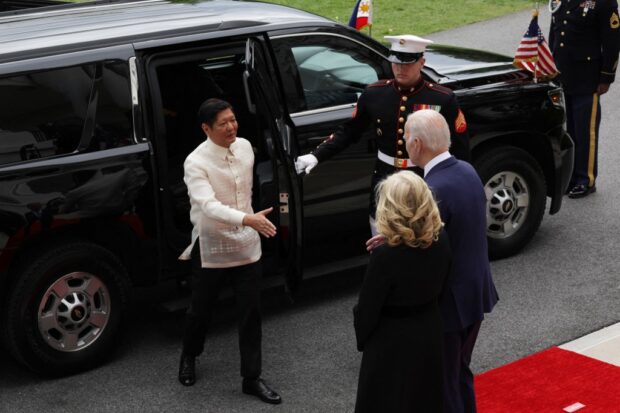Jeers at Lafayette, cheers at the Ritz

WASHINGTON, DC – MAY 01: U.S. President Joe Biden and first lady Jill Biden welcome President of the Philippines Ferdinand Marcos Jr. to the White House, May 1, 2023 in Washington, DC. President Biden will hold a bilateral meeting with President Marcos in the Oval Office to discuss “efforts to strengthen the longstanding U.S.-Philippines alliance. Alex Wong/Getty Images/AFP
WASHINGTON—Filipino Americans with sharply contrasting views of President Marcos and his family made sure they were heard as he covered the first leg of his official five-day visit to the United States.
One group revived a protest slogan once roundly directed at his late father, while the other celebrated his arrival in a fiesta-like atmosphere.
Some 50 protesters, gathered at Lafayette Square and organized by the US chapter of Bagong Alyansang Makabayan, chanted “Marcos, Diktador, Pasista!” as the President’s convoy of black sport utility vehicles and its American security escorts made its way to the White House around 2 p.m. on Monday (early Tuesday in Manila).
“Marcos is not welcome here!” cried the protesters, who also accused the President of directly benefiting from his parents’ ill-gotten wealth.
Exile’s daughter
Among them was Lisa Simbulan, whose family’s uprooting from the Philippines and relocation to the United States can be traced to a painful experience during the elder Marcos’ regime.
“After more than 30 years, we still have to get justice,” said Simbulan, whose father Dante was a military intelligence officer who later became an activist-professor incurring the government’s ire during martial law. The elder Simbulan went into self-exile in the United States after being detained in the Philippines for more than two years without charges in the mid-1970s.
‘Retire in better PH’
Later in the day, though some of the protesters managed to reach the street fronting the Ritz-Carlton Hotel, a more welcoming crowd awaited the President once he got inside.
About 2,000 Marcos supporters gathered for the President’s visit, their “loyalty” dating back to his father’s time.
Visibly elated, the President thanked the crowd for their support, boasting that the nearly 32 million votes he got was the biggest by any presidential candidate in the country’s history.
He urged them to tell their children and grandchildren to visit the country and “see for themselves what the Philippines is about, what is our culture, what is our history.”
“I’m sure the first- and second- and third-generation Filipino Americans are more than happy to learn about their proud Philippine ancestry,” he said.
“It’s my hope that some of you will come home for good and retire in a much better Philippines, a Philippines with better airports, Philippines with better roads, better internet, better governance. That’s my dream,” he said, drawing loud cheers. INQ